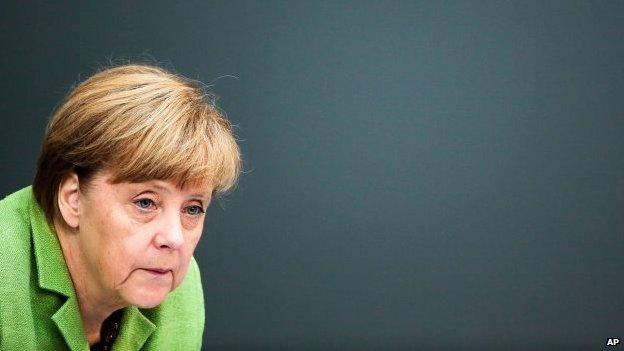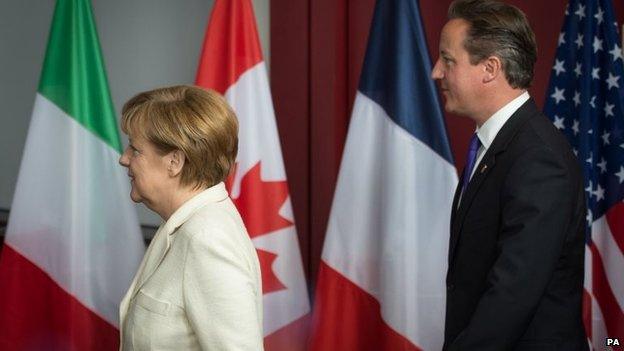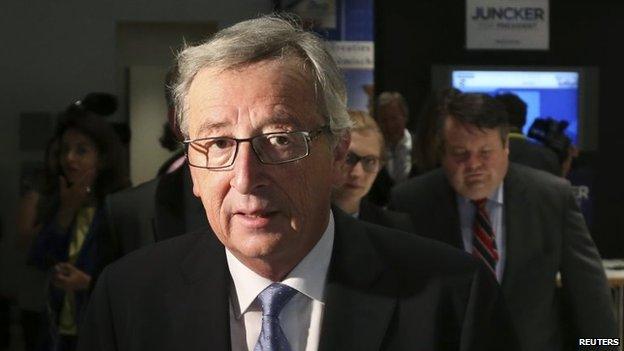Is Merkel damaged by the EU's Juncker row?
- Published
- comments

Angela Merkel's judgement has been questioned by the German press
In the battle over who should become the next president of the European Commission, David Cameron is depicted as the loser - "isolated", "incompetent", a serial mis-reader of Brussels politics.
Yet David Cameron is not alone in finding himself in a corner, defending a position he cannot retreat from.
Several leaders who doubted whether Jean-Claude Juncker was the best candidate for the job are now uncomfortably lining up behind him.
But Angela Merkel's position is almost as uncomfortable as that of David Cameron. Frau Europe's authority has been damaged.
It was not just that she was forced to back down when she suggested other names apart from that of Mr Juncker should be considered for the top job.
She flinched as some outraged German columnists pointed out that during the campaign she had told voters the election would determine the next Commission president.

Downing Street feels that Ms Merkel has expressed different views in public and in private
Although I believe it is reparable, there is new tension to the German-British relationship.
Downing Street firmly believes it had received assurances from Chancellor Merkel that the Juncker issue would be fixed. Her advisers say that her position was made more difficult by the prime minister's veiled threats about Britain leaving Europe.
Unusually, even at home, Angela Merkel's judgement has been questioned.
One German commentator said that she "looked almost lost, tugged here and there by forces that she does not control".
Certainly she has lost out on what for her are important points of principle.
She has long believed that big countries such as Germany and Britain should not be steamrollered during the major arguments. Britain's objections look set to be ignored.
'Worst possible mistake'
Although much of the German political establishment has seen a strengthening of the European Parliament as one answer to the EU's democratic deficit, Chancellor Merkel is said to be uncomfortable at a shift in power towards the European Parliament which could weaken the ability of heads of government to define the agenda.
There is already a fall-out from the battle over the Commission presidency.
The centre-left in Europe, led by Italian Prime Minister Matteo Renzi and President Francois Hollande of France, have seized an opportunity to push their case for a change of course in Europe. Yes, they have agreed to back Mr Juncker but in exchange for a commitment to support their growth agenda.
The centre-left wants a more flexible interpretation of the EU's budget and deficit rules.

Mr Juncker has sought to reassure Germany that the Stability Pact will not be changed
Mr Renzi has turned on what he calls the "high priests" of austerity and has warned "there can be no stability possible if there is no growth in Europe".
These moves have clearly rattled the German government. The powerful German Finance Minister Wolfgang Schaeuble has said that EU members should "stick to the rules we jointly drew up. Nothing more, nothing less".
He went on to say that "running up new debt would be the worst possible mistake we could make".
The head of the Bundesbank Jens Weidmann has weighed in arguing that an easing of the budget rules "could trigger massive shocks" in the eurozone.
Mr Juncker, to reassure the Germans, has said that "it will not be the case that the Stability Pact will be changed", but seems set to explore some of the flexibility in the wording.
But it only underlines how a president of the Commission essentially selected by the parliament will be drawn into political battles.
It may be one of those unintended consequences but the arguments over the EU's top jobs have opened up new divisions over the budget rules and, this time, Angela Merkel's authority is less certain.